Thailand’s cultural contributions to world heritage are out of all proportion to its size and population. When one thinks of Thailand, an array of very distinct and unique activities come to mind which lie at the heart of the culture: superb Thai food; relaxing and invigorating Thai massage; and at the other end of the spectrum the gritty, rough and tumble sport of Thai boxing.
The modern sport of Thai boxing, known as “the art of eight limbs” since fighters use eight points of contact – hands, feet, elbows, and knees – has evolved from the ancient form of close, hand-to-hand combat that was necessary to defend oneself in battle hundreds of years ago. With the constant threat of war from Thailand’s neighbors, training centers slowly began to appear throughout the kingdom, these being essentially the country’s first Muay Thai camps.
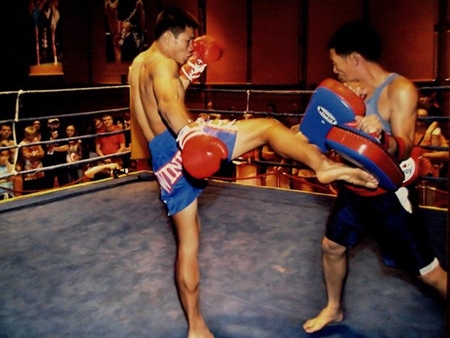
Over time, Thai boxing became increasingly ritualized and formalized, and evolved, along with initiating as a monk, into a rite of passage into adulthood for young Thai men. Just as through their training in Buddhism in local temples, the young men’s Muay Thai training teaches them discipline, respect, honor, order, and fitness – qualities that may not have been present in many of their lives before.
Thus, many Thai boxing training camps have come to act much like extended family units, instilling these virtues in young boys who turn to boxing for diverse reasons. As with many of the world’s less fortunate individuals, there are few avenues to break out of the life they were born into.
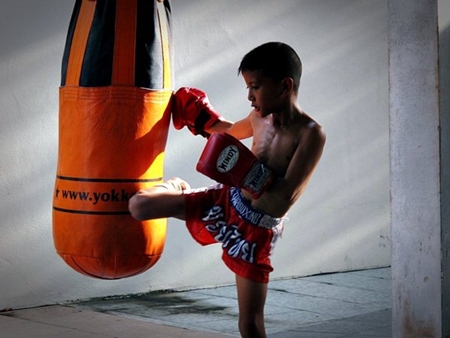
In Thailand, Thai boxing is one of the few options for social mobility for your typical rice farmer, which is the background of many a Thai boxer. It is a chance for them to garner respect, develop self-esteem, and earn a noble livelihood. Then again, other young men enter the discipline for the sheer love of the sport and their innate competitive drive.
The function Thai boxing fulfills in Thai society is accordingly multifaceted: Thai youth seeking an exciting, better future are drawn to the sport, which is actually equal parts athleticism, discipline, and art; and like sport everywhere, Thai boxing meets a social need of the community, creates and strengthens familial and village bonds, and serves as an outlet and temporary escape from their very traditional, often difficult lives.
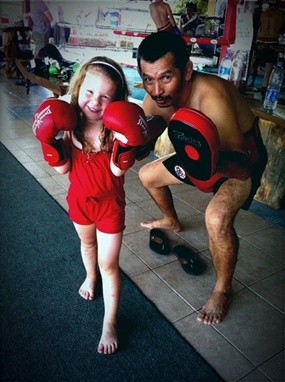
As tourism to Thailand has increased over the past few decades, visitors have been drawn to this fascinating element of Thai culture. For many years, however travelers seeking to enjoy Thai boxing matches had to go a bit native, and either catch fights in small villages upcountry, or at throw-down “stables” in larger towns.
Those seeking more excitement and adventure eventually made their way to the great stadia in Bangkok, the dream venue for thousands of hungry young fighters: Lumpini and Ratchadamnoen. These modern coliseums remain fascinating cultural experiences for tourists, far beyond the fighting itself, given the rambunctious atmosphere, the loud traditional music, and all the shouting and betting.
Muay Thai has traditionally been supported by Thai Kings, including the current one, and is now being actively promoted by the Thai government and the Tourism Authority of Thailand. It is a source of national pride that the Kingdom’s traditional martial art is now so internationally admired and respected. Surely, Thai boxing has now come into its own and its future looks very bright indeed.
Perhaps Muay Thai’s greatest ambassador was Yodthong Senanan, who for over fifty years operated the renowned Sityodthong Boxing Camp in Pattaya. Until his sad demise at age 76 in February of this year, Master Yodthong was largely responsible for popularizing Muay Thai, as well as training many champions. Following his lead, a number of successful Thai boxing camps have been established, such as Singpatong, Tiger, and Sinbi boxing camps in Phuket, and the Elite Boxing Club in Bangkok, and their teachers have become famous in Thailand, as one would expect from purveyors of the fine points of Thailand’s national sport.
Sityodthong Boxing Camp
Address : 36/7 Moo 6 Nongprue Banglamung Chonburi Thailand,
Pattaya, Thailand 20260
Email : [email protected]
Website : www.sityodtongmuaythai.com, fb.com/sityodtongteam
Singpatong Boxing Camp
Address: 29 Hasipess Road, Patong Beach, Kathu District, Phuket Province, Thailand, 83150
Contact:Pee Num 0856644035, email: [email protected]
Website: http://www.singpatongsitnumnoi.com/
Tiger Muay Thai & MMA Training Camp
Address: 7/6 Moo 5 Soi Tad-ied
Ao Chalong, Muang
Phuket, Thailand, 83100
Contact: TMT Office:+66 (0)76 367 071-2, Night Office:+66 (0)88 116 8066
Skype (office hours):tigermuaythai
Website: www.tigermuaythai.com
Sinbi Muay Thai Boxing Camp
Address: Sinbi Muay Thai 100/15 Moo 7, Saiyuan Road Rawai Muang Phuket 83100 Thailand
Contact: “Sing” who speaks Thai and English: +66 0 833915535
“Dave” general enquiries, marketing and likely to be awake late: +66 (0)911621510
“Sarah” (English) for bookings enquiries:+66 0 808798092
“Gob” If you are wondering when the shop will open, need laundry, vip changes or a taxi then you can call Gob who speaks quite good English. +66 0895464426
Website: http://sinbi-muaythai.com
Elite Fight Club Thailand
Address: The Waterford Diamond Tower, 10th Floor
Soi Sukhumvit 30/1 Sukhumvit Rd. Klongton,
Klongtoey, Bangkok Thailand 10110
Telephone: +66 (0) 2305 6685
FAX: +66 (0) 2256 9900
E-mail: [email protected]
Website: http://www.elitefightclub.com/
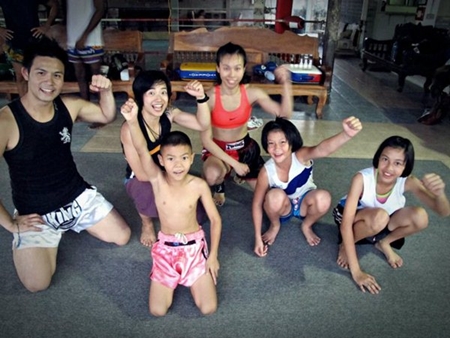
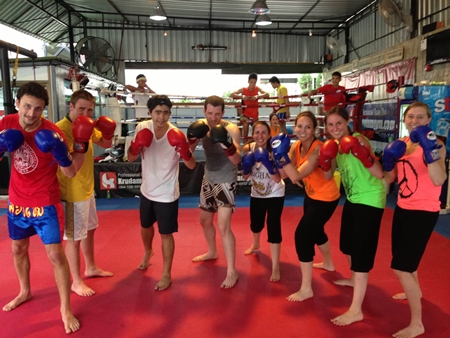
Contact Information:
International Public Relations Division
Tourism Authority of Thailand
Tel: +66 (0) 2250 5500 ext. 4545-48
Fax: +66 (0) 2253 7419
E-mail: [email protected]
Web site: www.tatnews.org




